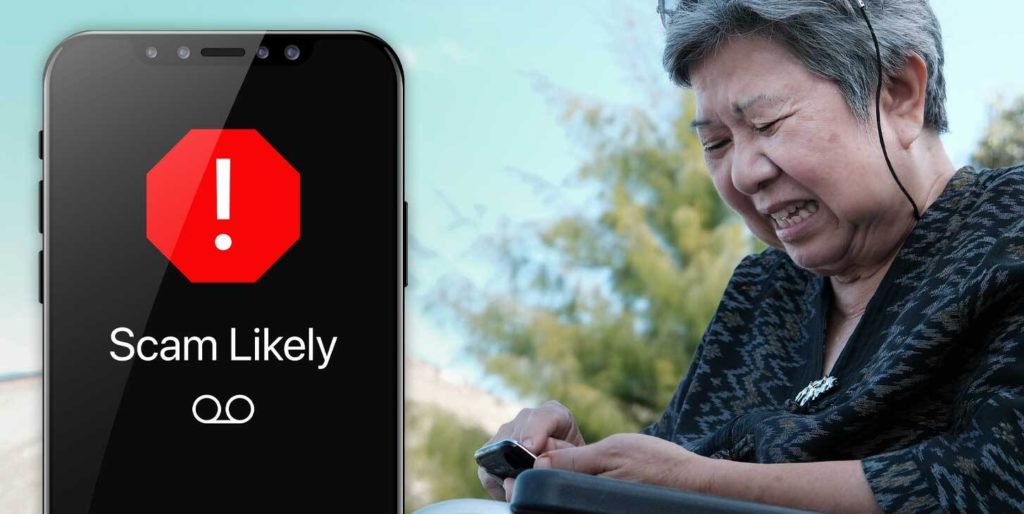Think of your sweet, innocent grandmother.
You got her in your head? The cookies she makes? The floral pattern on her blouse? Her soft smile when you finally visit?
Now, imagine her getting a call from someone claiming to be the IRS. They disturb her calm, apple-pie demeanor to tell her she is in serious trouble. She’s told she owes a debt of $25,000 the tax collectors. Overwhelmed, your grandmother, a law-abiding woman of principle, decides she has no choice but to settle up before things get worse. She hurriedly calls a cab to take her to the bank to retrieve the funds. No one has any idea this is happening, not her adult children or her tech-savvy grandchildren. It’s all happening too fast. She’s about to make a dire, honest mistake before anyone can come to her aid. It sounds like a total nightmare scenario yet totally plausible, right?
Well, it actually happened in real life.
A 92-year-old from Roseville, California, got that call. The person on the other end claimed to be the IRS. They told her she owed a debt of $25K. And she called a taxi to get to the bank to withdraw the funds immediately. She lucked out though. After telling the cab driver what she was up to, he convinced her to go to the police station instead. It was the singular act of a good Samaritan that circumvented the whole scam.
Your grandmother, however, may not get so lucky. We want to make sure nobody’s vulnerable loved one is taken advantage of again.
In this article, we cover:
- The elderly falling victim to phone scams.
- Why seniors are vulnerable.
- The call blocker that can truly protect Grandma.
The elderly are a powerful group. The most highly represented age group in American politics are those 65 years old or older, at 64 percent. They are our wisest, most experienced age group. Unfortunately, those 60 to 69 reported more fraud (20 percent) and more fraud losses ($223 million) to the FTC in 2019 than any other age group.
In another instance, an oncology nurse in her 60s was scammed out of nearly $340,000 in 2019 by a caller claiming to be an FBI agent.
The whole thing started with a simple robocall.
The mental and emotional toll of falling victim to a scam can get even more dire. After falling victim to an awful phone scam that cost her life savings, an 82-year-old woman in Maine took her own life. She died with just $69 left in her bank account. The scammers had her believe she won a large cash prize but needed to pay the taxes and fees on it to collect.
Seniors are targeted because they tend to have large savings accounts and the effects of age often compromise their ability to fight off these attacks. They might be easily confused or overwhelmed when a caller pressures them. The very politeness that often makes the elderly so endearing might also be their undoing, as they struggle to say “no” and hang up the phone. They also may not realize they were duped weeks or months ago, and when they finally do realize, they might be too ashamed to admit it and report the crime.
These scams are vile. The perpetrators sometimes pose as Medicare representatives asking for a Social Security number or medical ID. Or they might trick their victims into thinking their grandkids are calling to ask for money to bail them out of a financial hardship. Some get conned into thinking a family member has been involved in an accident and needs money for hospital bills. Other times, the scammer poses as a charity in need. The criminals behind these scams will cross any line to defraud their innocent victims.
You Can Protect Her
On the bright side, younger age groups fall victim to phone fraud far less than their elders. The onus is on those who are younger and often more technically savvy to proactively protect their grandparents.
One of your first thoughts may be to install a robocall blocking app on Grandma’s phone. Good, but not any one will do. Be wary of overly simple robocall blockers that simply show a “Scam Likely” message on the screen or stop Grandma’s phone from ringing at all. Those callers are usually allowed to leave a scary voicemail, to which Grandma could listen and still fall victim.

If you want to truly protect Grandma, consider YouMail. The malicious voicemail isn’t just hidden from her inbox, your phone automatically detects unwanted calls, prevents the phone from ringing in the first place, and plays an “out of service” message to the scammer. The call is then disconnected.
Clean. Simple. Effective.

YouMail instantly alerts you with an explanation of why the call was subverted, such as “An IRS scam was blocked.” And if she still taps the number to call the fraudster back, we display a warning to her and try to stop her from initiating the call out. The best part: these and the rest of YouMail’s sophisticated safety features are free.
Now, the next time Grandma’s phone buzzes, you can rest easy that she’s no longer easy prey.





